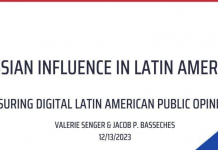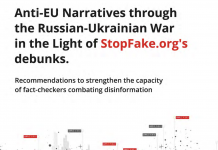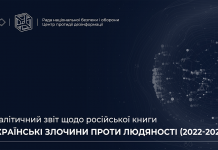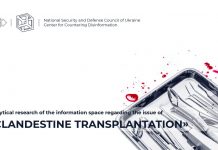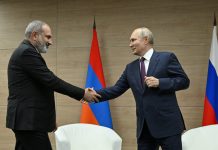Russian Influence in Latin America: Measuring Digital Latin American Public Opinion
This research by Valerie Senger and Jacob P. Basseches (Center for Latin American Studies (CLAS) at Georgetown University’s Walsh School of Foreign Service) deals with Russian...
Anti-EU Narratives through the Russian-Ukrainian War in the Light of StopFake.org’s debunks
Recommendations to strengthen the capacity of fact-checkers combating disinformation
Full text of the study here
The research and recommendations were developed by a working group of...
In Israel-Hamas conflict, social media become tools of propaganda and disinformation
By Dina Sadek, Layla Mashkoor, for DFRLab
An endless flood of false, misleading, and unverified information risks inflaming the conflict.
In the wake of renewed warfare between Hamas...
Protecting point-to-point messaging apps: Understanding Telegram, WeChat, and WhatsApp in the United States
By Iria Puyosa, for DFRLab
DOWNLOAD PDF
Executive summary
Too often, consideration of point-to-point messaging platforms in the United States is focused on either diaspora or second-language...
Analytical report on the Russian book «Ukrainian crimes against humanity (2022-2023)»
By the Center for Countering Disinformation, the National Security and Defence Council
By the Center for Countering Disinformation, the National Security and Defence Council
New report highlights evidence of escalating Russian genocide in Ukraine
By Kristina Hook, for UkraineAlert
The brutality of Russia’s full-scale invasion of Ukraine has shocked many, even as Ukrainians and regional experts have noted that...
Analytical research of the information space regarding the issue of «Clandestine transplantation»
By Center for Countering Disinformation
Center for Countering Disinformation analyzed the information space to identify russian campaigns around the topic of black transplantation.
Since 2014, russia...
Pro-Russia actors target Armenia with anti-Ukraine propaganda
By Ani Mejlumyan, Roman Osadchuk, for DFRLab
Pro-Russian actors are spreading false and misleading narratives that draw negative parallels between Ukrainian President Volodymyr Zelenskyy and Armenian Prime...
Russian Media Deny The Srebrenica Genocide To Deflect Responsibility For Bucha
By EUvsDisinfo
The Srebrenica Memorial Center published the report “Denial of the Srebrenica genocide in the Russian media”. It shows how prominent Russian mass media outlets, as...
Incitement To Genocide Against Ukrainians In Russian And Belarusian Propaganda
By iSans
Download .PDF (452,79 Kb)
The iSANS research team has completed its work on a pilot report «Incitement to genocide against Ukrainians in Russian and Belarusian...


